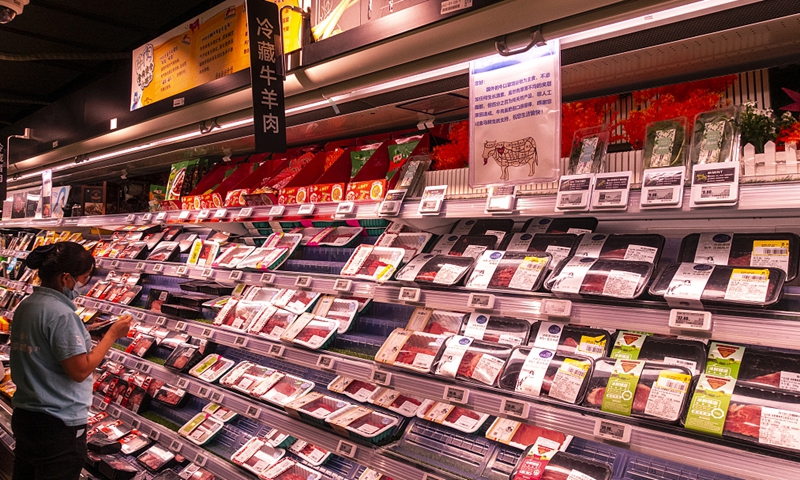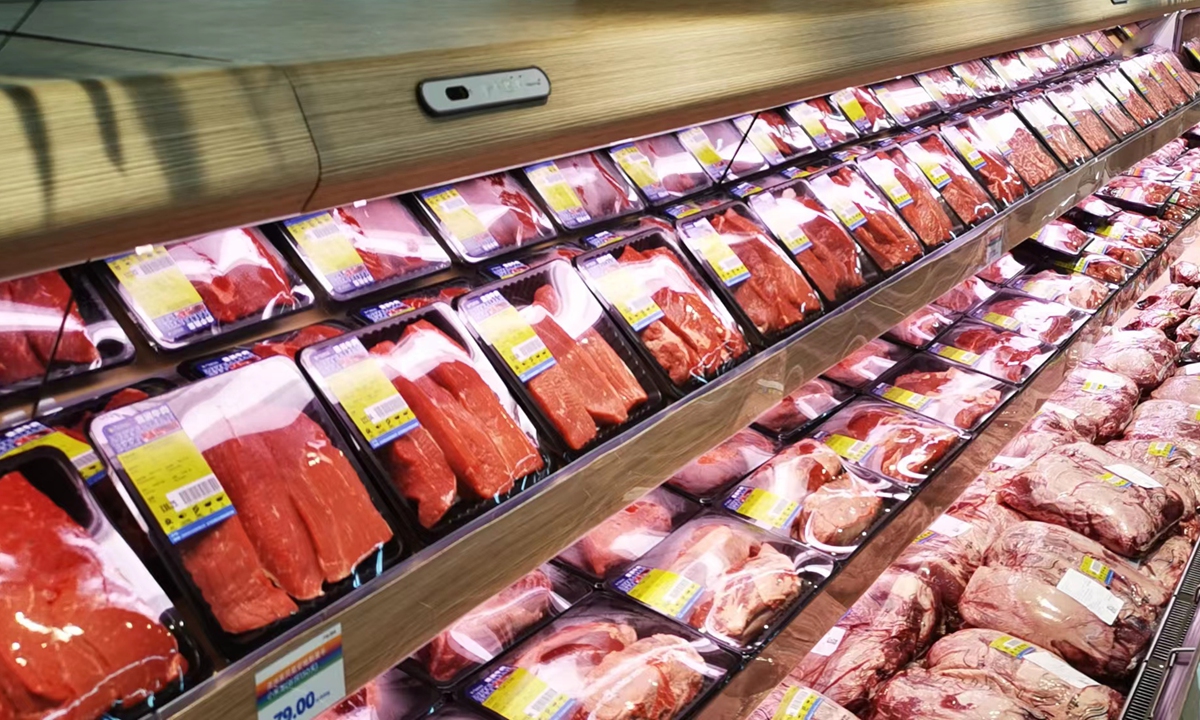China lifts ban on Spanish beef, strengthening trade ties amid concerns over EU protectionism
Opening-up instead of protectionism to deal with bilateral trade friction

Imported beef is sold in a supermarket in Shanghai. Photo: VCG
China has announced that it will lift a ban on imports of Spanish beef, a new beginning for EU beef exports after an embargo that lasted nearly one-quarter century. The move was announced by Chinese Foreign Minister Wang Yi when he paid a visit to Spain, as Wang said that China regards Spain as a good and trustworthy partner in the EU and stands ready to inject new momentum into China-EU relations.
Chinese experts said that the move shows the Chinese government's concrete efforts to enhance China-EU trade, a positive signal that China is opening up, amid rising trade protectionism in Europe.
On Sunday, China lifted restrictions on the import of deboned beef from Spain for cattle under 30 months of age, China's General Administration of Customs (GAC) said on Monday.
The decision was first declared by Wang during a joint press conference with his Spanish counterpart José Manuel Albares in Cordoba, Spain on Sunday.
During the meeting, Wang highlighted the broadening of bilateral cooperation into new sectors, including electric vehicles, green energy and the digital economy, and he welcomed Spain to use various trade platforms to increase exports of high-quality products to China.
"Opening-up and cooperation is the endogenous driving force for the development of China-Spain relations," Wang said.
"When you take into account the size of the Chinese market, the impact is going to be extraordinarily positive," Albares was quoted as saying by AFP.
Since 2000, China has banned the EU from exporting beef products to China due to multiple cases of "mad cow" disease in several members of the bloc that year.
China's lifting of the restrictions on Spanish beef came after a slew of antitrust measures by the EU against China. The latest example was that the European Commission is investigating a subsidiary of Chinese rail giant CRRC to see whether there were subsidies to unfairly undercut European rivals. A major anti-subsidy investigation into Chinese electric vehicles was initiated in October 2023.
Regarding the dilemma, Chinese experts said that the lifted ban instead shows a positive signal that China is opening-up, instead of pursuing protectionism, and the comparison is surely to be seen by the whole world.
Facing the EU's trade protectionism, China did not respond with sanctions, instead, it issued further measures to open up. The decision could be seen as a positive gesture toward the European business community, potentially aiding in policy adjustments within the EU political sphere, Huo Jianguo, vice chairman of the China Society for World Trade Organization Studies in Beijing, told the Global Times on Monday.
"The move shows that we are very confident and determined in handling our economic and trade relations with Europe, including dealing with some issues that involve frictions," Cui Jianhong, a professor with the Academy of Regional and Global Governance at Beijing Foreign Studies University, said on Monday.
"In the past, when facing frictions with the EU, our first reaction was often to counter-attack, or use tit-for-tat measures," Cui said. "In some areas, we must have tit for tat, but in some other areas we should show our role as a responsible major country."
"A good way to handle bilateral relations is to seek an overall trend of moving forward," Cui noted.
China's total trade with the EU reached 5.5 trillion yuan ($764.9 billion) in 2023, according to the GAC, a decline of 1.9 percent from the previous year.
Ahead of Wang's visit, the Chinese Foreign Ministry said on Thursday that it would be China's foreign minister's first visit to Spain in nearly six years. China hopes that this visit will enable both sides to further implement the common understandings reached by the two heads of state, continue the friendly atmosphere of the 50th anniversary of diplomatic ties, consolidate mutual trust, enhance friendship, promote cooperation and enrich the China-Spain comprehensive strategic partnership.



